News
Millions chopped off national power grid over unbearable bills
View(s):By Nathara Abeywickrema
Thousands of homes are being cut off from the national electricity grid in the wake of 18% tariff increase in October when the domestic category of up to 30 kilowatt hours was increased from Rs. 150 to Rs. 180.
The latest figures from the Ceylon Electricity Board (CEB) show that in November and December last year, some 145,000 homes have been disconnected from power supply. (see graphic) 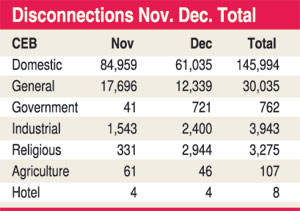
October increases came after the Government imposed a 66% revision in February last year and then it was reduced by 14% in July. Fixed charges were also raised sharply. Power and Energy Minister Kanchana Wijesekera had argued for full “cost-reflective’’ pricing.
In 2023, the CEB and Lanka Electricity Company Limited (LECO) had cut supply to 965,566 and 98,834, respectively, or more than 1.06 million out of 7 million users.
Some residents of Colombo city said paying electricity bills is a struggle while disconnection looms large.
Siththi Farida, who comes from family of five, from a suburban community in Grandpass, said she plans to take a loan to pay off a Rs. 20,000 electricity bill. Before the tariff revision, she would get a bill for Rs. 3,000. “Despite hardly using much equipment, Our monthly payment normally comes to Rs. 6,000.”

A. Sathyapriya
It is extremely difficult for Fathima Rizmina, a mother of two from the same area, to pay the bills after her husband left her. “We are worried about whether we’ll eat tomorrow, so how can we afford a big payment with our meagre savings,” she asks.
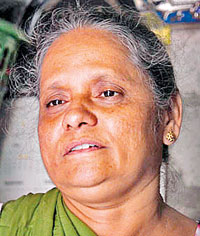
Siththi Farida
Rizmina was forced to spend the night with her children in a neighbouring household on Wednesday after power was disconnected over an unpaid Rs. 20,000 electricity bill.
A. Dharshani is one among many who are borrowing to pay bills. Hailing from a family of five, she said that the Rs. 3,000 late payment fee has been an additional hardship.
Despite turning off our refrigerator and other equipment, we continue to receive bills of Rs. 6,000. We will have to pawn our possessions.
“Even with the tariff rise eliminated. However, electricity prices will definitely remain high,” she added.
A. Sathyapriya, a housewife and mother to three, and whose husband is tuk tuk driver too, finds it an uphill task to settle their electricity bills. “We are not able to afford food. It’s becoming extremely difficult and there are days when I have absolutely nothing in the house.”
It is heart-wrenching that Sathyapriya and her family are relying on electricity from their mother’s home next door after their power supply was disconnected over a week ago due to an unsettled bill of Rs. 15,000.
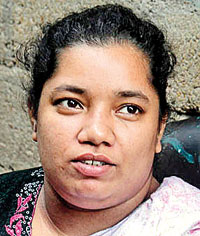
Fathima Rizmina
Meanwhile, Electricity Consumers’ Association (ECA) secretary Sanjeewa Dhammika asserts that consumers should receive an equal share of the58% of profitgenerated by the CEB amounting to Rs. 12,000 following the most recent tariff increase.
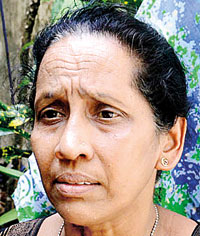
A. Dharshani
“It is completely unreasonable to charge Rs. 3,000 to restore a power supply that was before only Rs. 200 and has turned into a business that needs to be resolved as soon as possible,” Mr. Dhammika stressed.
He pointed out that CEB had recommended that customers use electricity sparingly due to the dry weather, but that there were insufficient controls over street lighting, which are functioning in the daytime too.
He also called attention to the fact that the CEB is withholding information about the substantial number of unpaid bills.
“The engineers at CEB have also refrained from pursuing other energy sources. Today’s high electricity costs, which reduce profitability, are the main reason why many foreign businesses are hesitant to invest here. Instead, they go to nations with far lower electricity bills,” Mr. Dhammika noted.
It has been noted that economically disadvantaged households are at high risk of being disconnected two to three months after the present dry season.
Meanwhile, sources recently revealed that significant unpaid energy bill arrears as of 2022, by a number of well-known and wealthy businesses and individuals, has an adverse effect on the nation’s impoverished.
The CEB was unavailable for comment.
However, the minister admits that the electricity tariff reduction is uncertain as recent rains have mainly led to hydropower generation, causing a significant increase in electricity production. The looming dry spell may soon exhaust hydropower capacity, necessitating reliance on thermal power, which could lead to higher generation costs.
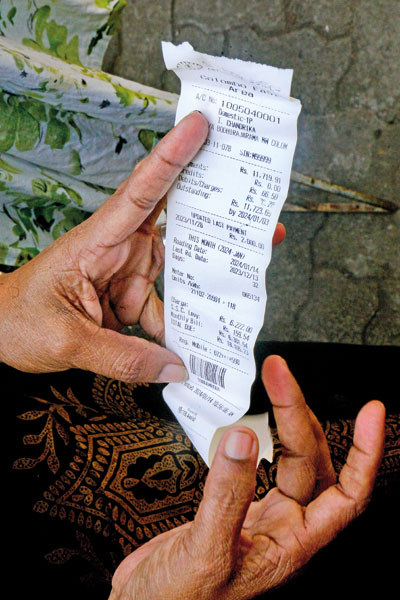
Some are forced to take loans to pay off bills. Pix by Eshan Fernando
The best way to say that you found the home of your dreams is by finding it on Hitad.lk. We have listings for apartments for sale or rent in Sri Lanka, no matter what locale you're looking for! Whether you live in Colombo, Galle, Kandy, Matara, Jaffna and more - we've got them all!

